Kenya Offers to Lead Intervention Force
BY JAKE JOHNSTON – CHRIS FRANÇOIS

Photograph Source: Wahogo – CC BY-SA 4.0
In a statement released on Twitter Saturday, Kenya’s foreign minister Alfred Mutua expressed his country’s intention to lead a multinational force in Haiti — a contingent of 1,000 police officers to “help train and assist Haitian police restore [sic] normalcy in the country and protect strategic installations.” An assessment mission is expected to travel to Haiti in the coming weeks.
The same day, US Secretary of State Antony Blinken spoke with Kenyan president William Ruto to discuss regional security issues, including the offer to lead a multinational force in Haiti. For many years, Kenya has been a key US military ally in East Africa, hosting US military bases and participating in US-backed operations on the continent, including the war against al-Shabaab in Somalia.
Kenya’s announcement comes after a high-level US delegation that included Todd Robinson, the head of the State Department’s Bureau of International Narcotics and Law Enforcement Affairs, traveled to Nairobi last week. Former US ambassador to Haiti Michel Sison, now the assistant secretary of state for international organization affairs, and former head of the UN mission to Haiti Helen Lalime, who now serves as an advisor to Sison, were both reportedly involved in the discussions.
On Monday, State Department spokesperson Matthew Miller said that the United States and Ecuador would draft a UN Security Council resolution to authorize deployment of the international force, though the mission would not be a traditional UN peacekeeping operation. The US is “committed to finding the resources to support this multinational force,” Miller added.
The offer of police assistance was welcomed both by the de facto Haitian authorities, who initially requested such an intervention in October 2022, and by UN Secretary-General Antonio Guterres, who is due to deliver a report to the Security Council this month on “the full range of support options the United Nations can provide to enhance the security situation.” On Tuesday, the Bahamian government, which has been intercepting record numbers of Haitian migrants, announced that it would provide an additional 150 officers for the planned force.
For the last year, countries have been reluctant to lead such a mission to Haiti, in part due to concerns about the mandate of de facto prime minister Ariel Henry and the lack of a broad-based political accord. Canada, which the US had pressured to lead an intervention force, has instead focused on financial and technical assistance to the Haitian police. On Monday, Prime Minister Justin Trudeau, while welcoming Kenya’s offer, appeared frustrated with the pace of reform and lack of political dialogue.
“We’ve been there in Haiti for three decades at different times to help counter the violence, the political instability, an appalling humanitarian situation, and we still find ourselves now in a situation that is among the worst ever,” he said. “We are here to put pressure on the political class in Haiti, which is not taking seriously the responsibility they have to compromise and restore security.”
The issue of foreign forces remains a point of contention for many Haitians. In particular, there are concerns about the Kenyan forces’ reputation. The Associated Press reported that, “as the U.S. government was considering Kenya to lead a multinational force in Haiti, it was also openly warning Kenyan police officers against violent abuses.” Haiti’s ex-prime minister Claude Joseph, a member of the opposition to the de facto authorities, also expressed concern: “Kenya […] is embroiled in its own internal socio-political crisis. […] The anti-government protests against the rising cost of living are violently repressed by the police. Can a police force that is not professional in its own country act as such abroad?”
In The New York Times, Jean Jonassaint, a professor at Syracuse who studies Haiti, questioned the choice of Kenya to lead such a mission, given the language barrier. “I don’t think 1,000 soldiers can solve the problem in Haiti, especially coming from Kenya, because they don’t speak French, don’t speak Haitian Creole and cannot communicate directly to the population,” he said. The US and UN have pledged to learn from previous failed interventions, but the language barrier was also a significant issue in the 13-year MINUSTAH operation, which was led by Portuguese-speaking Brazilian troops.
The announcement of a multinational force also threatens to derail ongoing political negotiations. For months, Haitian civil society organizations have warned that the imposition of a security intervention, without first establishing a more broadly acceptable and legitimate transitional government, would be unlikely to succeed, and would instead simply consolidate the de facto authorities’ power.
Escalation of violence prompts US Embassy to call for evacuation
The US State Department has ordered its nonemergency staff at the US embassy in Port-au-Prince to leave Haiti due to escalating violence. It also reissued its “Do Not Travel” advisory for the country, which advises US citizens to leave the country immediately. Earlier in the week, dozens of Haitians displaced by ongoing violence, and seeking refuge in front of the US embassy, were teargassed by the Haitian National Police (PNH). Those attacked included children and pregnant women.
In a July 26 press release, the National Human Rights Defense Network (RNDDH), condemned the PNH officers’ behavior, and in particular criticized the PNH’s acting director general, Frantz Elbe:
“RNDDH condemns with the utmost rigor the outrageous use of force by PNH agents against a population left alone to fight, who, by going to the premises of the US Embassy in Haiti, were only seeking refuge. RNDDH recalls that the right to seek refuge whenever one’s life, safety, or any other fundamental rights and freedoms are threatened or violated, is recognized for all persons.”
Those who sought shelter outside the embassy had fled violence perpetrated by the Kraze Baryè gang led by Vitel’homme Innocent, who is wanted by the FBI in connection with the kidnapping of missionaries in 2021. In its release, RNDDH accused Innocent of being Elbe’s “protege.” The organization claims that Innocent is known to travel accompanied by state vehicles and that in recent weeks he had met with state officials. Since then, attacks have intensified, RNDDH reported.
On the same day the US issued its travel advisory, a US nurse and her young child were kidnapped in the Cité Soleil neighborhood of Port-au-Prince, where she worked at a local clinic. The case has generated international headlines, President Joe Biden has been briefed, and the US government has said it is working for their release.
After a brief respite — seemingly as a result of the Bwa Kale citizen justice movement — local groups have documented a sharp rise in violence in recent months. RNDDH reported at least 40 people abducted and 75 murdered from May to mid-July.
US Senate holds two Haiti-related meetings
Last week, the Senate Foreign Relations Committee held two hearings related to Haiti. On Tuesday, the committee held a nomination hearing for Dennis Hankins, President Biden’s nominee for the next US ambassador to Haiti. This was followed the next day by a hearing with Assistant Secretary of State for the Western Hemisphere Brian Nichols and a top USAID official. Despite the high-level attention on Haiti and the looming prospect of a US-financed multinational intervention, only two senators showed up to ask questions.
EU amends rules to impose sanctions on individuals and businesses in Haiti
The Council of the European Union amended its sanctions regime in order to allow the EU to autonomously impose restrictive measures on “individuals and entities responsible for threatening the peace, security or stability of Haiti, or for undermining democracy or the rule of law in Haiti.” While no individual or entity has been sanctioned at this stage, the measures are comprised of a travel ban for individuals, as well as a freezing of funds for individuals and entities. In addition, EU entities and individuals will be forbidden from making funds available to those listed, either directly or indirectly.
“With this new framework for restrictive measures, we are sending a clear signal to Haitian gang leaders and their financiers: we know how they operate and there will be no impunity. The EU stands with Haiti and its people,” Josep Borell, EU High Representative for Foreign Affairs and Security Policy stated. The EU joins Canada, the US and the United Nations in issuing sanctions against Haitian individuals and entities.
The EU, however, has been reluctant to take leadership or an active role in the planned multinational force. In conversations with the press ahead of the EU-Latin America and Caribbean Summit, the EU Ambassador to Haiti, Stefano Gatto, said that the bloc could not support Haiti without the leadership of the United States and Canada. “Proposing to engage our security apparatus in Haiti when the Russian army is just 300 kilometers away from the European Union is quite complex,” he said, highlighting that the war in Ukraine had captured the bloc’s attention.
“In the field of security, we could not be at the forefront or take the leadership,” Gatto added. “There are countries much closer to Haiti that can do it on our behalf. Why would the Union help Haiti when countries in the hemisphere such as the United States, Canada, or the Latin American countries, are not doing it themselves? […] We can participate in any initiative if it is led by a country from the American hemisphere.”
Expulsions and deportations of Haiti continue
On August 2, ICE deported some 55 Haitians to Port-au-Prince. The move comes less than a week after US officials ordered the departure of all nonemergency staff, due to safety concerns. According to Witness at the Border, it is the 285th such flight to Haiti since the beginning of the Biden administration, sending a total of more than 27,000 individuals to Haiti.
While welcoming Kenya’s offer of security assistance, Dominican president Luis Abinader pledged to continue with his country’s draconian immigration enforcement. Over the last year, the Dominican Republic deported over 200,000 Haitians, while also building a wall along its border with Haiti.
A long interactive piece in the Washington Post looks at smuggling routes in the Bahamas that are transporting record numbers of Haitians seeking to make the journey to the US. “So far this year, Bahamian authorities have apprehended 1,736 migrants, 1,281 of them Haitian,” The Post reports. Meanwhile, this fiscal year the US Coast Guard has intercepted more than 5,000 Haitians.
Haitians around the globe march for relief
In more than 70 countries around the world, thousands of Haitians marched on July 9 to call for relief for Haiti. In the United States, marches led by pastor Gregory Toussaint in South Florida called on Congress to pass the Haiti Criminal Collusion Transparency Act, which was just approved by the House and is now pending in the Senate. The act would mandate the State Department to regularly report on ties between Haitian elites and criminal gangs and for the US to implement sanctions on those identified. The protesters also requested for the Biden administration’s Humanitarian Parole program to remain open.
The Humanitarian Parole program also remains highly controversial, with many PNH officers applying to leave the country, a disastrous blow to the force when it is already unable to tackle the country’s security crisis. Marleine Bastien, a Haitian community activist and immigration rights advocate in South Florida, called the program “ill-advised and ill-conceived” back in February. Others have argued that the program is further exacerbating the country’s brain drain. Florida governor Ron DeSantis and the leaders of 19 other Republican states are challenging the legality of the program in federal court. According to the Department of Homeland security, some 63,000 Haitians have been approved for travel and more than 50,000 have arrived in the US.
A different march was organized by several Haitian diaspora organizations on July 21 in Washington DC, titled “Haitian Solidarity Day for Change.” In an interview ahead of the protest, one of the organizers said the effort was aimed at telling the White House that they must change their policy toward Haiti and for the international community to stop deciding for Haitians. “The decision of the country is up to the Haitians, we want to be around the table and take charge of the destiny of our country,” they said.
Haiti loses an icon
On July 31, Liliane Pierre-Paul, a long-time journalist and outspoken champion for democracy and press freedom, died of a heart attack. “Liliane will always be remembered for her courage, her determination, her profound beliefs in the democratic ideals so many died for,” Michèle Montas, widow of the slain journalist Jean Dominique, told the Miami Herald. For more on the life and legacy of Pierre-Paul, read the entire Herald article.
This first appeared on CEPR.
August 07, 2023
Associated Press

PORT-AU-PRINCE, HAITI —
Several thousand people — their faces covered to conceal their identities — marched through Haiti's capital on Monday demanding protection from violent gangs that are pillaging neighborhoods in the capital Port-au-Prince and beyond.
Haitians' daily lives have been disrupted by incessant gang violence that has worsened poverty across the country as it awaits a decision from the U.N. Security Council over a potential deployment of an international armed force.
"We want security!" the crowd chanted as it marched for two hours from the troubled community of Carrefour-Feuilles to Champ de Mars in the downtown area and then to the prime minister's official residence, where police broke up the demonstration with tear gas.
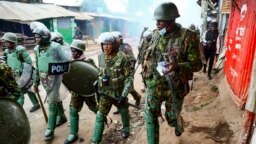
Haitians Express Skepticism Over Kenya's Offer to Send Police to Confront Gangs
"I can't work. I can't go out. I'm like a prisoner in my own home," said Wilene Joseph, a 36-year-old street vendor and mother of two who joined the march out of frustration.
"I worry about my kids being shot because bullets are flying from all directions all the time," Joseph said of her children, ages 5 and 7. "The situation is unacceptable."
Since the assassination of President Jovenel Moïse in 2021, experts say gangs have seized control of up to 80% of Port-au-Prince, killing, raping and sowing terror in communities already suffering endemic poverty.
From January to March, more than 1,600 people have been reported killed, injured or kidnapped, a nearly 30% increase compared with the last three months of 2022, according to the newest U.N. report.
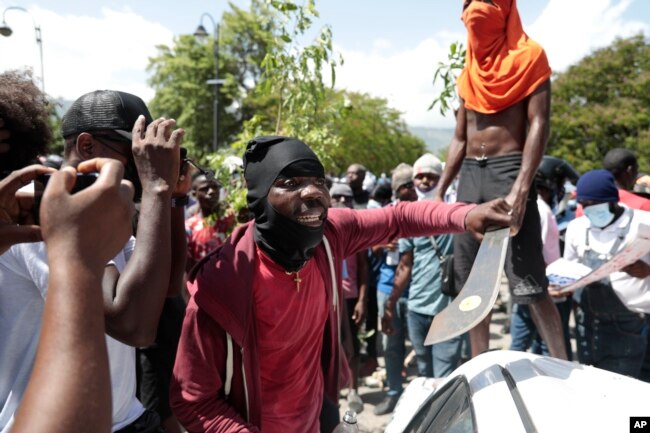
On Monday, UNICEF announced an "alarming spike" in kidnappings, with nearly 300 confirmed cases so far this year, almost equaling the number reported for all of last year, and almost three times the total for 2021.
The agency noted that women and children are increasingly being kidnapped and used for financial or tactical gain. Among those kidnapped in late July was Alix Dorsainvil, a U.S. nurse from New Hampshire, and her young daughter. Dorsainvil works for El Roi Haiti, a Christian organization that offers medical care, education and other services. She and her daughter remain in the hands of their captors, who are demanding $1 million in ransom.

Haiti Hospital Cares for Kids Amid Gang Violence, Hunger, Scarce Aid
Parents of young children are particularly fearful that gangs will snatch them when they go to and from school. Nacheline Nore, 40, said her two boys, ages 10 and 8, have to call her every day as soon as they step inside their school, and she rides back home with them every afternoon: "You don't know who's going to be the next target," she said.
Mario Jenty, a 36-year-old cell phone vendor who joined Monday's march, said the increase in kidnappings is pushing Haitians into even deeper poverty. "They're going to have to sell that home to pay for ransom, and there's a chance they might not be released," he said of the victims.
Jenty, who lives in Carrefour-Feuilles, said he would not allow gangs to take over his neighborhood. "I'm going to fight this," he said. "I'd rather die than leave my community."
Jenty joined the thousands of Haitians who yelled "Bwa kale!" on Monday as they marched, a reference to a violent uprising that began earlier this year, with civilians targeting suspected gang members. More than 200 people have been slain since then, and demonstrators vowed to keep the movement alive as gangs overwhelm Haiti's understaffed and under resourced police department.
Last October, Haiti's prime minister and other top-ranking officials requested the urgent deployment of an international armed force to help quell gang violence.
In late July, Kenya offered to lead a multinational police force, but the U.N. Security Council has yet to vote on a resolution to authorize a non-U.N. multinational mission. The United States said last week that it would put forward such a resolution.
07 August 2023
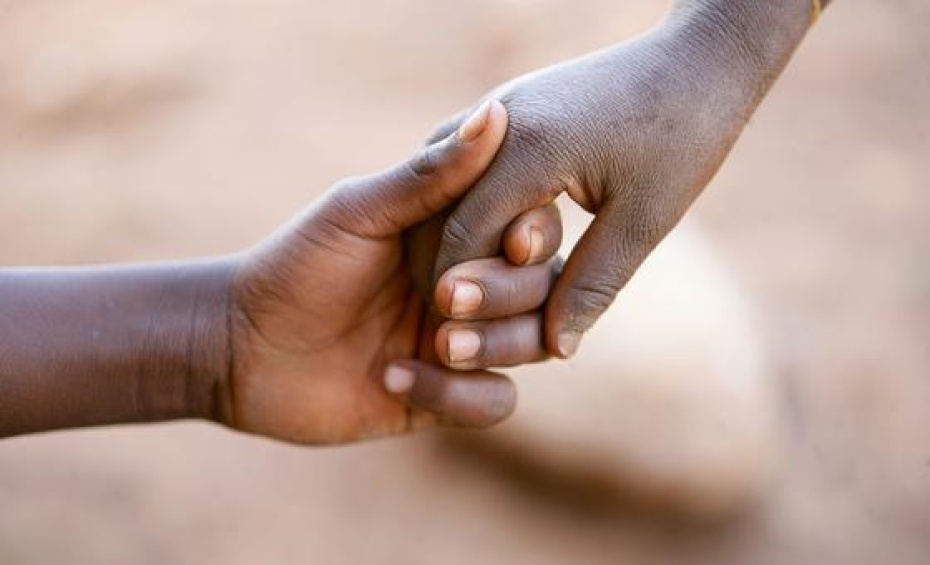
Persistent violence in Haiti remains a significant concern for the safety and welfare of its most vulnerable citizens, especially women and children, the UN Children’s Fund (UNICEF) said on Monday, citing reports of an “alarming spike” in kidnapping and other crimes.
According to UNICEFOpens in new window, nearly 300 confirmed cases were reported in the first six months of 2023, almost matching the total number documented over 2022 and close to three times the number in 2021.
“The stories we are hearing from UNICEF staff and partners on the ground are shocking and unacceptable,” Gary Conille, UNICEF Regional Director for Latin America and the Caribbean, said in a news releaseOpens in new window.
“The growing trend in kidnappings and abductions is extremely worrisome, threatening both the people of Haiti and those whoOpens in new window have come to help,” he added.
In most instances, children and women are forcefully taken by armed groups and used for financial or tactical gains. The victims who manage to return home grapple with deep physical and psychological scars, possibly for many years.
Women and children are not bargaining chips
The overall situation in Haiti is catastrophic. Today, an estimated 5.2 million people, or close to half of the entire population, require humanitarian assistance, including almost three million children.
Children find themselves in the crossfire, or directly targeted, and women and girls face extreme sexual violence, as armed groups terrorize the population in their fight for territory and control, mainly in the capital, Port-au-Prince, and also in other regions.
“Women and children are not commodities. They are not bargaining chips. And they must never be exposed to such unimaginable violence,” Mr. Conille said, calling for the immediate release and safe return of all those who have been kidnapped.
Health system on verge of collapse
On top of crime and violence, reports indicate that local healthcare systems are teetering on the brink of collapse amid a resurgence of cholera and severe malnutrition.
The increase in violence, looting, road blockades, and the pervasive presence of armed groups severely obstruct humanitarian efforts, making it difficult to deliver much-needed aid to affected communities, UNICEF said, noting that as months go by, it adds an increasing layer of fear and complexity to an already challenging environment for those delivering life-saving aid.
The assassination of the President of Haiti in 2021 plunged the country into a deep political crisis, which has been exacerbated by an unprecedented breakdown in security.
Armed criminal gangs are said to be “imposing a regime of terrorOpens in new window” and violence in most parts of Port-au-Prince, severely impacting the humanitarian, human rights and socio-economic situation in a country already hit hard by poverty, disease and disasters.
Commitment to support those in need
The UN agency added that it stands steadfast in its commitment to deliver critical aid and support for Haiti's children who have been impacted by these traumatic events.
Beyond its initial crisis response, UNICEF supports the children and victims of the crimes, and working alongside partners, provides life-saving assistance, ensuring access to medical care, psychosocial support, and safe spaces where children can begin the process of healing and recovery.
“I have witnessed the remarkable resilience of Haitian children, women and families as they face seemingly insurmountable challenges, refusing to surrender,” said Mr. Conille.
“However, their bravery is being met with increasing, unthinkable terror. It must stop now.”
Copyright © africanews
By Rédaction Africanews
KENYA
Kenya is ready to lead a multinational force in Haiti and will deploy 1,000 police officers to the strife-torn Caribbean nation once its offer is accepted, the foreign minister said Saturday.
Gangs control around 80 percent of the Haitian capital, and violent crimes such as kidnappings for ransom, armed robbery and carjackings are common.
UN Secretary-General Antonio Guterres and Haitian Prime Minister Ariel Henry have for nearly a year sought international intervention to help support the police, but no country had stepped forward.
"Kenya has accepted to positively consider leading a Multi-National Force to Haiti," Kenya's Foreign Minister Alfred Mutua said in a statement late Saturday.
"Kenya's commitment is to deploy a contingent of 1,000 police officers to help train and assist Haitian police restore normalcy in the country and protect strategic installations."
Its "proposed deployment" still required a mandate from the UN Security Council and approval from domestic authorities, he said.
"An Assessment Mission by a Task Team of the Kenya Police is scheduled within the next few weeks. This assessment will inform and guide the mandate and operational requirements of the Mission."
US Secretary of State Antony Blinken spoke by phone last night to Kenyan president William Ruto, according to State Department spokesperson Matthew Miller.
Kenya is seen as a democratic anchor in East Africa, and has participated in peacekeeping operations in its immediate region including in the Democratic Republic of Congo and Somalia.
No other details about the Haiti deployment were immediately available.
Haiti, the Western Hemisphere's poorest nation, has seen compounding humanitarian, political and security crises, with gangs controlling most of Port-au-Prince.
Guterres said this month that violence had continued "to escalate and spread", citing murders, kidnappings, rape of women and girls, looting, and the displacement of thousands of people.
Guterres, relaying a request from Henry, began calling in October for an international, non-UN deployment to help support police in the troubled nation.
The Security Council this month adopted a unanimous resolution encouraging member states "to provide security support to the Haitian National Police," including through "the deployment of a specialized force."
But the text, which was focused on a one-year extension of the mandate for the special UN political mission to Haiti, BINUH, stopped short of making any direct plans for such a force.
The council has asked Guterres to present by mid-August a report on all possible options, including a UN-led mission.
Earlier this month, Blinken said the US remained active in its search for a country to head a multinational force in Haiti.
This week, Washington ordered nonessential personnel and family of government employees to leave the country.
Staff at the US embassy in Port-au-Prince already live under tight security -- confined to a protected residential area and forbidden to walk around the capital or use any public transport or taxis.
Additional sources • AFP
There have been calls for foreign intervention in Haiti.
By Matt Rivers
July 31, 2023,
Haiti faces gang violence, growing humanitarian crisis
ABC News' Matt Rivers traveled with aid workers into one of the most dangerous spots in the world, where gang violence

PORT-AU-PRINCE, Haiti -- U.N. Secretary General António Guterres made his first-ever visit to Haiti on July 1 to impress urgency upon whomever would listen as the country struggles with gang violence and ravaging food insecurity.
"Every day counts," he said. "If we do not act now, instability and violence will have a lasting impact on generations of Haitians."
The U.N. chief said solving Haiti's crisis in the short-term requires a two-pronged approach that addresses both security and political concerns.
The international community largely agrees, though that is where the consensus ends. There remains fierce debate over what any solutions would look like.
This story is part of a series, "Haiti: The Forgotten Crisis." Please click here for more.
As long as gangs rule large swaths of the country, the interim government has said elections will not take place, a source in the Haitian police said.
Humanitarian aid will continue to suffer and the healthcare system will continue to teeter on collapse.
Some modicum of security must be returned to Port-au-Prince streets for any lasting solutions to take hold.
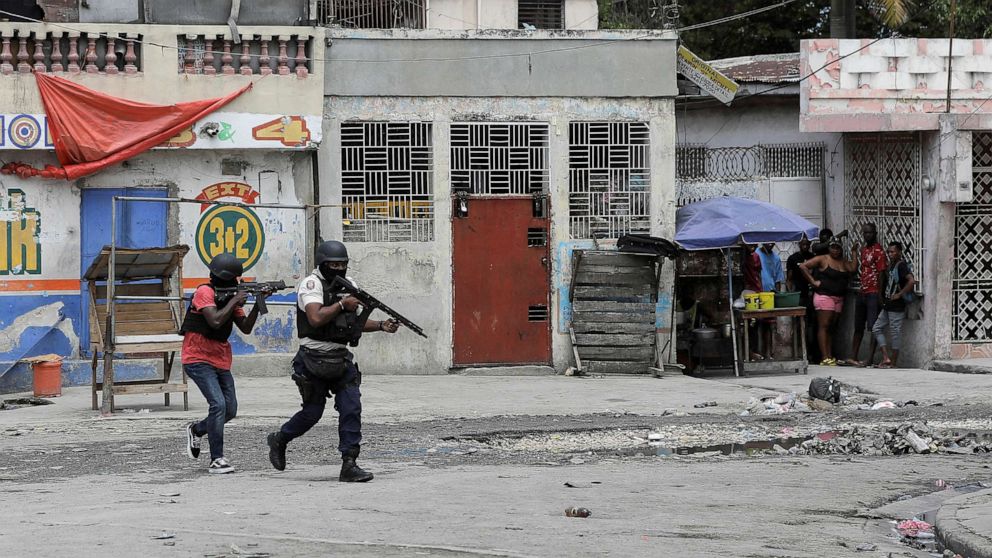
In this April 25, 20223, people huddle in a corner as police patrol the streets after gang members tried to attack a police station, in Port-au-Prince, Haiti.
Ralph Tedy Erol/Reuters, FILE
MORE: Haiti fights for its life in the streets: Reporter's notebook
Many, including Guterres, have argued Haiti's government and police force is not capable of providing that security purely on their own.
"I continue to urge the Security Council to authorize the immediate deployment of a robust international force to assist the Haitian National Police in its fight against the gangs," said Guterres in Port-au-Prince this month, something interim Prime Minister Ariel Henry agreed with.
Traditionally, Haitians are immensely skeptical of, and often outright reject, any solutions that involve foreign boots on the ground, a reluctance justified by the country's deep and painful history with such endeavors.
Many in the country still feel that way today.
There is, however, broad agreement among those in favor that the scope of mission for any such force must be extremely limited both in scope and length.
"Any force must be for a limited time and for a very specific mission, not just some U.N. peacekeeping force that didn't do anything to increase law enforcement capacity in Haiti when they left," said Etzer Emile, a Haitian economist and political scientist.
Daniel Foote, a former U.S. special envoy to Haiti, said foreign forces have become necessary, but believes it could be limited to just a few thousand troops.
"I would bring enough force protection to open choke points that the gangs have taken over," said Foote.
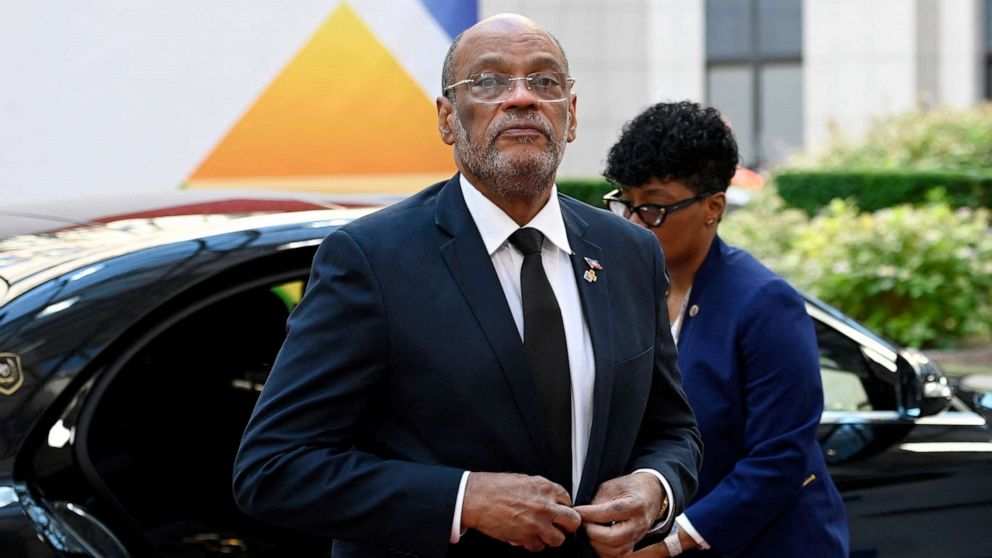
Haiti's Prime Minister Ariel Henry arrives for a summit of the European Union and the Community of Latin American and Caribbean States (EU-CELAC) in Brussels on July 18, 2023.
Jean-Christophe Verhaegen/AFP via Getty Images, FILE
The suggestion is striking because Foote is ideologically opposed to an intervention force. He very publicly resigned in protest in August 2021 over what he called the "inhumane, counterproductive" deportations of Haitians from the U.S., calling U.S. Haiti policy "deeply flawed."
He has few illusions of the U.S. or any other country playing the role of savior.
But crucial to any security force, he said, would be a concurrent political change; the installation of a transitional government that has the popular backing of large swaths of the Haitian population–a level of support Henry can't claim.
Henry took over as de facto leader roughly three weeks after President Jouvnel Moïse's assassination in July 2021, backed by the U.S. in a controversial move. He had been appointed only a few days before Moïse was killed and had not yet been sworn in. He's led since then without a popular mandate, overseeing the country's unraveling at every level.
For many in the country, he's known simply as Roi Henry, King Henry, because he is an unelected ruler.
In February, Henry appointed a transition council to hold general elections but he has failed to deliver. The fear for many Haitians is any elections held under Henry's leadership will be seen as illegitimate.
"I'm not for Henry leading the elections because he hasn't proven he can do that," said Emile, who also believes a broad transitional government should be installed. He believes Henry could be a part of that coalition. Foote does not.
"The people are kind of like f--- this guy and his elections," said Foote. "I think the international community is once again conflating elections with democracy."
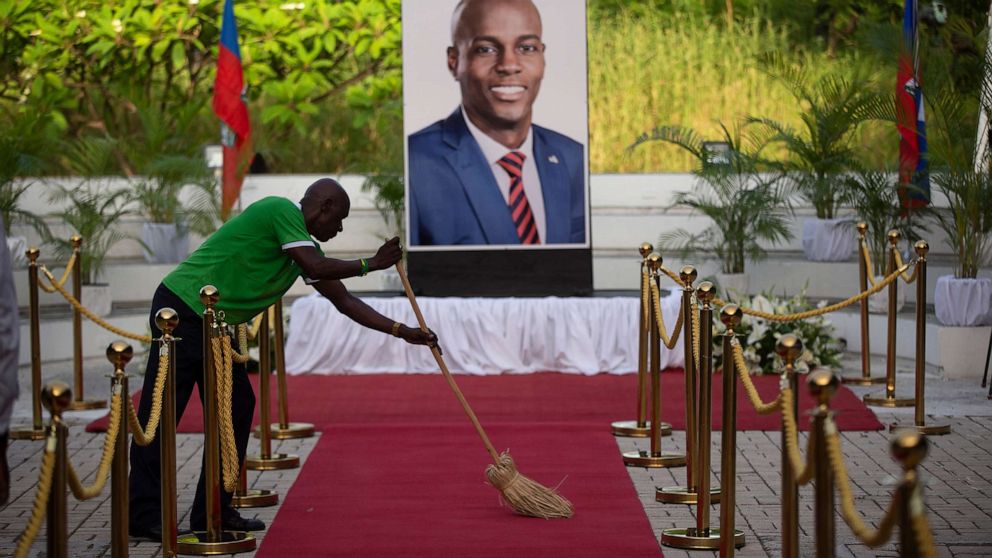
A man sweeps the red carpet laid out for a ceremony in memory of slain Haitian President Jovenel Moise, two years after his killing, at the National Pantheon Museum in Port-au-Prince, Haiti, July 7, 2023.
Odelyn Joseph/AP
The takeaway from both Emile and Foote is that Haitians must buy into any potential solutions–not the chosen few of the Haitian elite but rather broad swaths of the population. Foote describes it as threading a needle– difficult, but not impossible.
For now, the international community and, most importantly, the U.S. continue to back Henry.
Secretary of State Antony Blinken recently met with Henry on the sidelines of the Caribbean Community heads of government meeting in Trinidad and Tobago.
"First and foremost, we're supporting your efforts to develop an inclusive, broad-based consensus on a path forward for governance and for development," said Blinken, sitting alongside senior staff across a table from Henry, in another clear sign of U.S. support for the embattled leader.
What the U.S. says it wants–a "broad-based consensus on a path forward"--is a popular idea. But as long as the U.S. continues to back Henry as the one to lead Haiti toward that goal, many will remain skeptical.
The U.N. Security Council gave Guterres until mid-August to produce a report outlining "the full range of support options the United Nations can provide to enhance the security situation including…support for a non-United Nations multinational force, or a possible peacekeeping operation, in the context of supporting a political settlement in Haiti."
Presenting options is one thing. Acting upon them is another. That uncertainty leaves Haiti's path forward very much in doubt.
The 'Bwa Kale' movement is a vigilante force intent on taking on the gangs.
By Matt Rivers
July 31, 2023
'The Forgotten Crisis,' Part 1: Gang violence overwhelms Haiti amid political turmoil

PORT-AU-PRINCE, Haiti -- When handing out machetes on the streets of Haiti to people who've never really used them, it's important to wrap up the blades.
They're really sharp, and it's easy to hurt yourself, says Mertil Marcelin, a 35-year-old with a thick black beard who calls himself 'The Machete Man.' Though hurting people is kind of the point.
The Machete Man vibes around this Port-au-Prince neighborhood with an intense, ephemeral energy. He chats people up but he doesn't stay for long. There's work to do, after all, doling out melee weapons to the neighbors free of charge, so long as they promise to use them for one thing: protection from gang members.
This story is part of a series, "Haiti: The Forgotten Crisis." Please click here for more.
"One machete for every Haitian," he told ABC News. "It's the only thing the gangs are afraid of."
"Bwa Kale," he said to one woman.
"Bwa Kale," she said back.

In this April 25, 20223, people huddle in a corner as police patrol the streets after gang members tried to attack a police station, in Port-au-Prince, Haiti.
Ralph Tedy Erol/Reuters, FILE
MORE: Hospital in Haiti suspends treatment after armed men storm facility, forcibly remove gunshot victim
In Haitian Creole, Bwa Kale is crude slang for "erection." It is the kind of word that gets kids in trouble if said in front of their mothers.
In summer 2023, it's a catch-all term for a vigilante movement intent on reclaiming Haitian streets from the worst gang violence the country has ever known.
Gangs have long been an issue in Haiti but their power and the accompanying violence has exploded over the last two years.
Haitian law enforcement believes there are currently seven major gang coalitions operating across the country, made up of some 200 affiliated groups. That assessment comes from an internal Haitian National Police intelligence document obtained by ABC News.
They are well-armed, violent and determined to increase their own power. In many areas, gang is no longer a sufficient term as they run their own fiefdoms with iron fists, and often with total impunity.
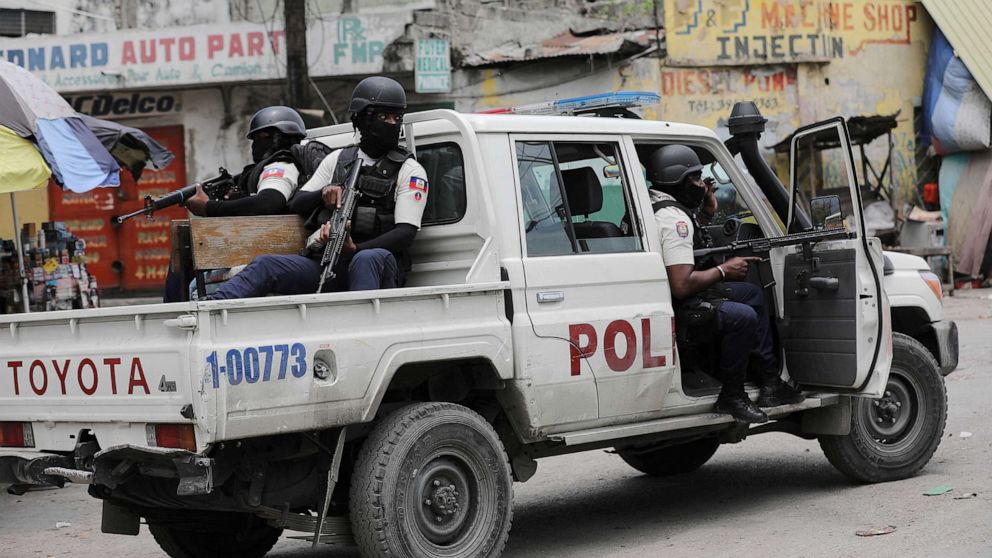
In this April 25, 2023, file photo. police patrol the streets after gang members tried to attack a police station, in Port-au-Prince, Haiti.
Ralph Tedy Erol/Reuters, FILE
Nearly two dozen armed gunmen stormed a Doctors Without Border hospital near the airport earlier this month, looking for a gunshot victim that had just been brought in for surgery. They pushed their way into the operating room, forcing doctors and nurses to stand aside mid-operation as they carried the victim out of the hospital. A Haitian police source told ABC News it is clear the attack was gang-related.
"There is such contempt for human life among the conflicting parties, and such violence in Port-au-Prince, that even the vulnerable, sick and wounded are not spared," said Mahaman Bachard Iro, head of Doctors Without Borders programs in Haiti. "How are we, the health workers, supposed to be able to continue providing care in this environment?"
The country has become paralyzed as these warring groups clash over territory, eager to earn more money through extortion, kidnapping and drug smuggling. The violence has left thousands of dead, many of them innocent, according to various counts from Haitian human rights groups. More than 850 civilians were killed in Haiti during the first four months of the year—that figure higher than that of Ukraine during that same timespan, according to the U.N.
A Haitian law enforcement source estimates at least 80% of Port-au-Prince, a city of about 2.5 million people, is firmly under gang control.
That means there is no real government presence in those areas. The gangs are judge, jury and executioner.
The law enforcement source added the percentage of the city under gang control could soon change. Police believe a recent "truce" between several of the larger gang coalitions could lead to attempts to expand their territory even further.
Haiti's government, what remains of it after the assassination of President Jovenel Moïse in July 2021, is either unable or unwilling to do anything to fight back. The police force, without enough funding or leadership, has been decimated. Dozens of officers have been killed fighting gang violence in the past few years, including 22 this year alone, according to the internal Haitian National Police intelligence document.
So the vigilante movement has begun to fill the void.
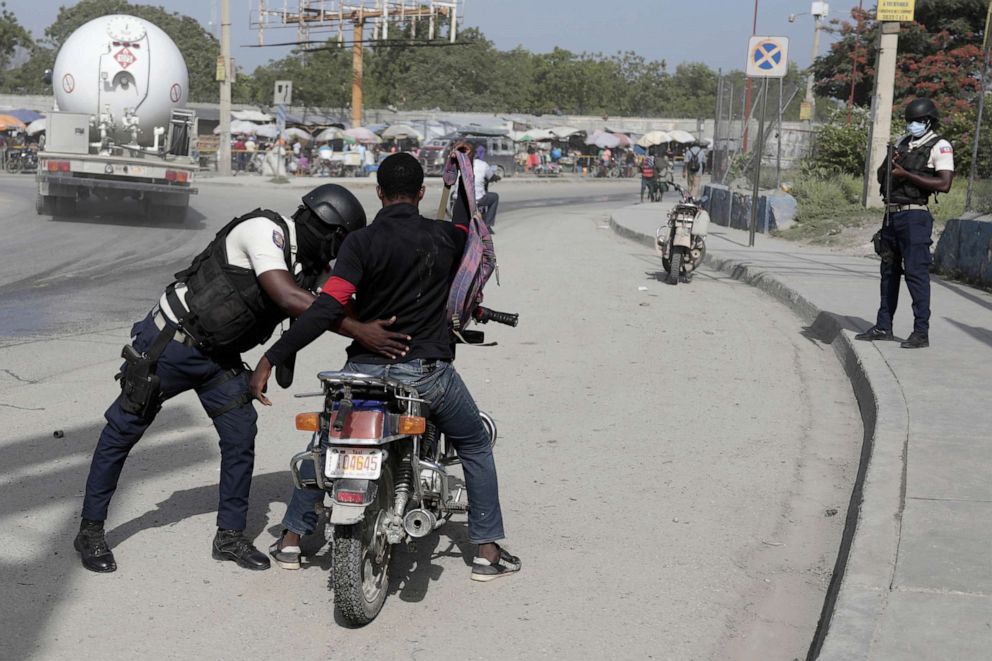
A police officer pats down a motorcyclist at a checkpoint in Port-au-Prince, Haiti, on July 1, 2023.
Odelyn Joseph/AP
Scores of neighborhoods now figuratively fly the Bwa Kale banner, with checkpoints manned by ordinary men springing up everywhere. The idea is to catch the gang members in the act—be it robbery or kidnappings or murder—and when they think they've caught someone, apply mob justice. That's where the machetes come into play.
The movement was responsible for the high-profile killings of more than a dozen suspected gang members in the Canape-Vert neighborhood in late April. Citizens overpowered police—or the police stood by, depending on which account you believe—stoning and burning the gang members to death. The movement has committed hundreds of murders since then, according to the U.N.'s High Commissioner for Human Rights (OHCHR). Some victims belonged to gangs, some were innocent, but all were extrajudicial killings. They show no signs of slowing down.
Where Haiti is today is the culmination of a decades-long downward spiral that went into overdrive on July 7, 2021, the day Moïse was shot and killed in his bedroom. His wife, Martine Moïse, was also shot multiple times but she survived.
At least 17 suspects have been arrested in connection with the assassination, including two U.S. citizens, identified by authorities as James Solages, 37, and Joseph Vincent, 57.
In June, Haitian-Chilean businessman Rodolphe Jaar was sentenced to life in prison by a Florida judge for providing weapons used in the assassination of Moïse. Jaar is the first person who has been convicted and sentenced in connection to Moïse’s death as others await trial.
The assassination sent an already-reeling Haitian government into a tailspin. Dozens of arrests have been made but no mastermind or motive has been revealed–and while the crime itself is an inflection point, it's just part of a centuries-long history of foreign oppression, corruption and violence that has led to the crises of today.
Since the former slave colony won its independence from France in 1804, the country has been plundered and exploited by richer, whiter countries. It was forced to pay tens of billions of dollars in reparations to France, a debt that took 122 years to pay back.
The U.S. didn't officially recognize Haiti until after the Civil War, fearful that doing so would inspire its own slaves to revolt. It helped block Haiti's access to international markets, violently occupying the country from 1915 to 1934 and controlling its public financing until after World War II. The U.S. siphoned off roughly 40% of Haiti's national income each year to service debt repayments. Decades of a brutal U.S.-backed dictatorship under the Duvalier family regime followed while U.S. agricultural interests in products like rice undercut the ability of many Haitian farmers to earn a living.
Even attempts to help have gone horribly wrong. A U.N. peacekeeping force from 2004 to 2017 was blamed for introducing cholera and for rampant sexual abuse among its soldiers.
Haiti is a country that has never really seen its own people govern themselves without constant foreign intervention, while only its elite class has reaped the benefits.
For politicians, members of the country's economic and social aristocracy, and leaders in law enforcement, graft was and is the rule, not the exception.
As they enriched themselves, tacit agreements between the elite and the capital city's gangs ensured that certain neighborhoods voted a certain way, worked in certain industries or, at a minimum, kept protests in check.
National elections have not been held since 2016 for a variety of reasons but prior to the assassination of Moïse, those tenuous bonds between gangs and the elite kept the country functioning at a basic level. Ordinary people did not live well but, generally speaking, they could at least live.
That's no longer guaranteed.
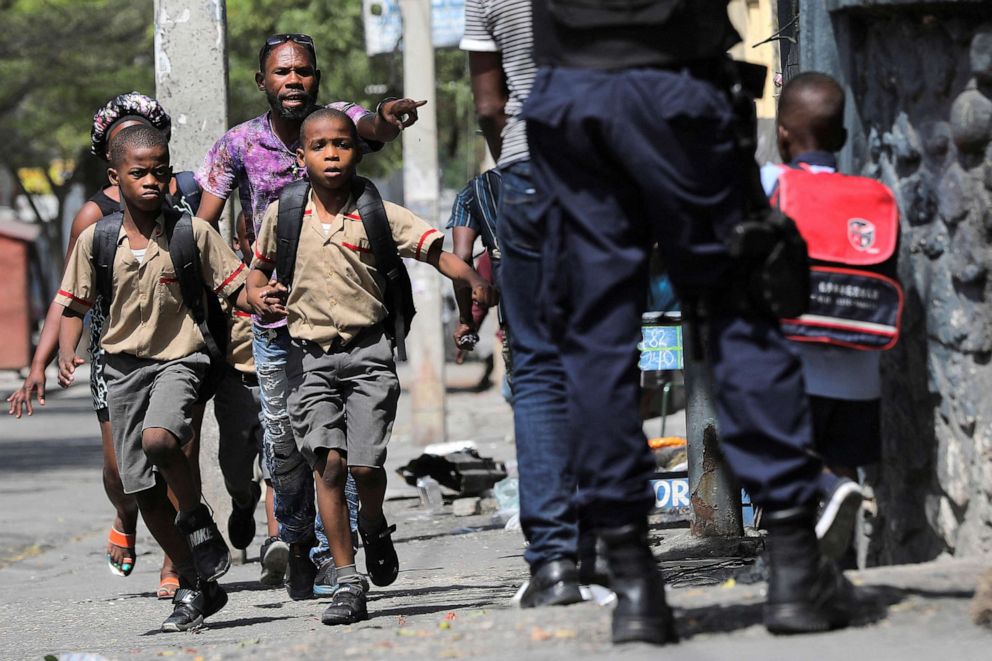
In this March 3, 2023, file photo, school children run for cover while leaving school amid gang violence in Port-au-Prince, Haiti.
Ralph Tedy Erol/Reuters, FILE
After Moïse's assassination, things quickly fell apart. Members of the political and social elite fled the country. There still have been no elections and right now, there is not one elected official serving in office at any level of government in Haiti–no president, no legislature, and no local mayors. The terms of anyone elected in 2016 have long since expired.
Haiti's government is currently led by a deeply unpopular, unelected prime minister in Ariel Henry who has himself been implicated in Moïse's assassination. Henry has denied any involvement in the assassination.
Tens of thousands of middle-class Haitians, mostly anyone who could, migrated to the U.S. or elsewhere.
Businesses closed-up shop, never to reopen, and civil society groups kept their heads down for fear of being a target of violence.
The country's police force proved more and more ineffective, crippled by a lack of resources and a subsequent lack of resolve. A few days after the assassination, the Minister of Elections said his daughter, a police officer, had fled to the U.S., "for her own safety."
The net effect of all this is that Haiti risks becoming a failed state. Some argue it already is.
"There is no magic solution for this crisis," said Etzer Emile, a Haitian economist and political scientist at the University of Quisqueya in Port-au-Prince. "As bad as things have been, it's never been like this before."
Port-au-Prince today is littered with checkpoints, marked by roadblocks set up by the Bwa Kale movement. They're made of a mish mash of whatever's at hand—boulders, trees, rebar. Burned out cars seem to be a favorite.
Cars serpentine through barricades in areas that nobody was driving in just a few weeks ago. The Bwa Kale movement has slowed gang activity around the capital but nobody believes the lull will last forever.
Nearly 5 million Haitians do not get enough food to eat on a daily basis.
By Matt Rivers
July 31, 2023
'The Forgotten Crisis,' Part 2: Haitians struggle to survive
Cut off from food and other resources, Haitians are left to make excruciating decisions.

PORT-AU-PRINCE, Haiti -- Haiti is in the grips of a ravaging hunger crisis, where nearly 5 million Haitians -- half of the country -- do not get enough to eat on a daily basis.
Nearly 2 million people are in what the World Food Programme calls IPC 4 – Emergency. This is its second-worst hunger classification, marked by acute malnutrition and excess mortality, just one step shy of famine and starvation.
Tens of thousands of people in a sprawling slum called Cité Soleil were formally classified as in famine last year, the first time WFP has recorded that in Haiti.
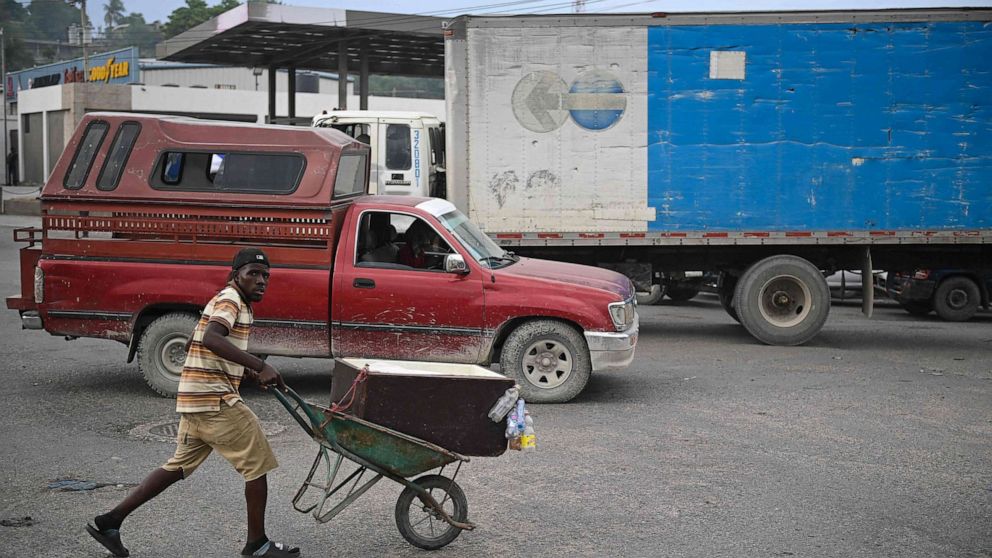
A man pushes a wheelbarrow in Port-au-Prince on June 28, 2023.
The crisis comes against the backdrop of the assassination of Haitian President Jovenel Moïse in July 2021 and gang violence is the worst it has ever been in the country.
The crisis is further pronounced in the pediatric section of the Hospital Universitarie de la Paix. Like nearly every other hospital in the city, it is overwhelmed, under-funded and barely staffed.
Once vibrant colors are fading on the walls, as paintings of animals and stars and numbers flake onto the ground. Every bed is full but it doesn't take a doctor to identify the kids who aren't getting enough to eat.
Gaunt, wide awake but supremely still, there are at least a half dozen children in this small ward being treated for severe acute malnutrition. Four-year-old Marvens Marachelle is one of them.
His mother, Paulette, gently peels off his clothes as a nurse pulls his legs through two holes in a blue canvas bag, like the kind you might put groceries in.
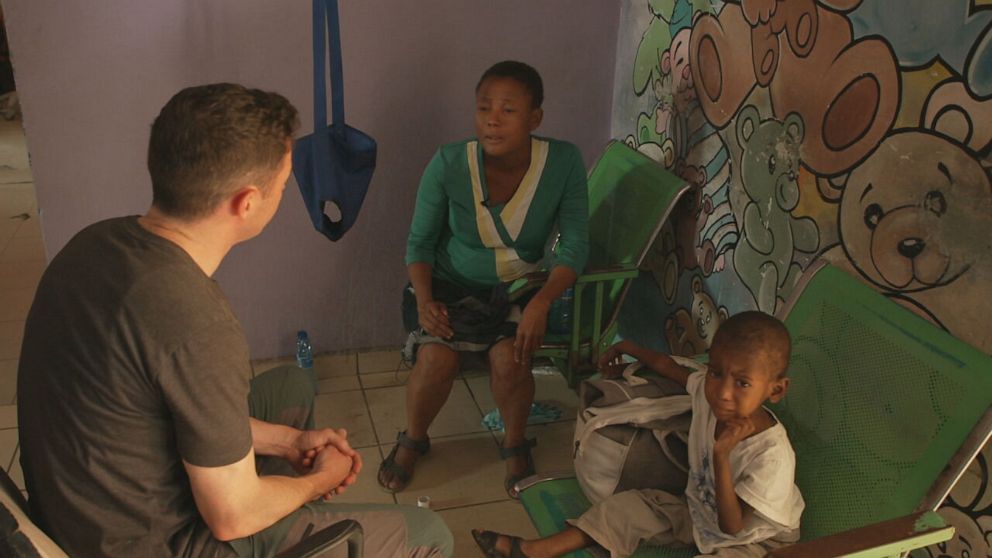
Paulette Marechal says her son is experiencing malnutrition.
They lift him up and hang the bag on a hook, his weight pulling it down. The scale above reads 9 kilos, about 20 pounds, the same as a healthy 10-month-old infant.
"He's had a fever and vomiting and he's been losing weight," said his mom, who said she knows he is hungry but can't find food consistently. She said she's now considering putting him up for adoption.
"I'm sad, sometimes my head gets heavy and I cry. I cry when I see what the country has become," she said.
As many as 115,000 Haitian children younger than five are expected to suffer from life threatening malnutrition this year, according to the latest U.N. figures, a 30% percent spike from last year. The United Nations World Food Programme recently announced a 25% cut of aid to Haiti due to a lack of funding.
There are myriad reasons for this hunger crisis that go back generations.
Haiti has long been undercut by foreign exploitation that has led to the decimation of local food production. Corruption prevents local economies from ever realizing their potential. Natural disasters have destroyed huge swaths of farmland. And given the gang control over Port-au-Prince, bad actors control the flow of food to and from different communities.
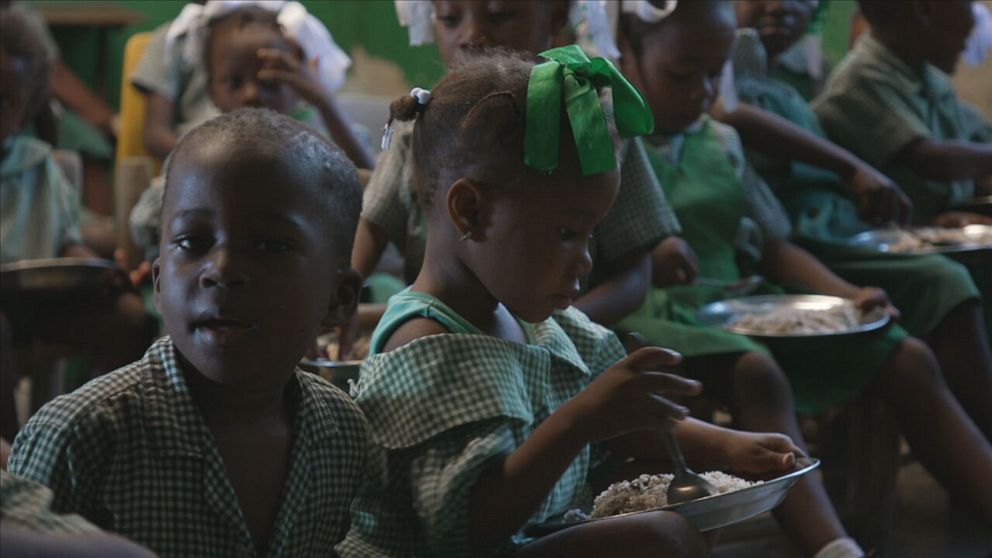
Haitian schoolchildren eat rice and beans.
But today it is gang violence that keeps Haitian-grown food from reaching Haitian stomachs.
Artibonite, the Haitian department --equivalent to a state or province-- is known as Haiti's breadbasket, where the country's deep connection to the earth and its bounties was born.
Gonaïves, the city at the department's heart, is about 90 miles or so from Port-au-Prince, roughly the same distance from New York to Philadelphia.
Traditionally, the only way to get there was driving on Highway 1, a twisting road that follows the coastline and crystalline waters of Port-au-Prince Bay.
These days, though, there's hardly anyone driving the road. It is entirely controlled by gangs, with a series of checkpoints manned often by drunk gang members still in their teens, the AK-47s slung over their shoulders significantly older than they are.
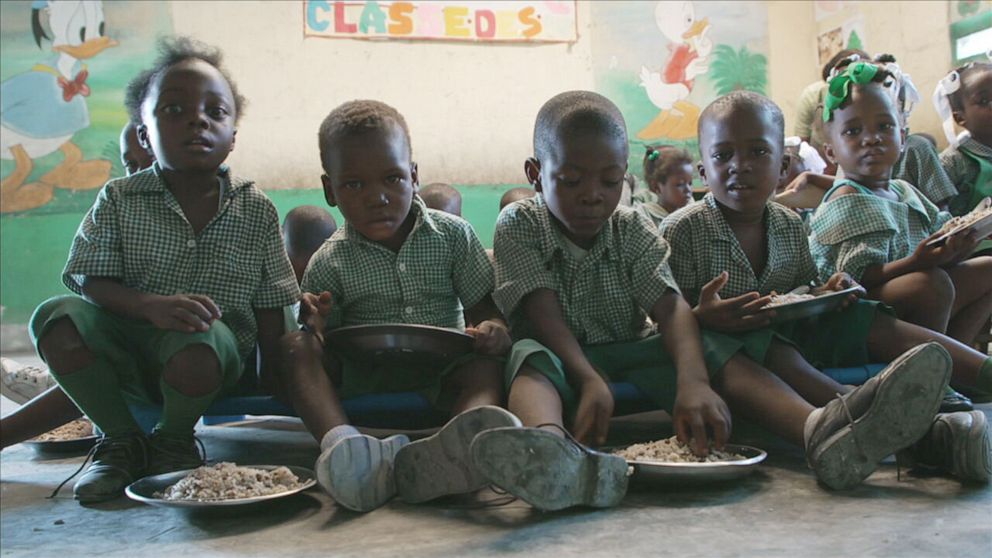
The hunger crisis in Haiti is impacting the children of the country.
Now, the only way to get to Gonaïves safely is by air.
For that, ABC News employed the services of an Mi-8 helicopter, an old Soviet twin-engine workhorse currently in the employ of the U.N.'s Humanitarian Air Services.
Haiti's beauty is staggering from above. Its rolling mountains cascade down into deep valleys, exploding in every shade of green and brown imaginable. The clear blue waters easing onto white sand beaches rival the best in the world. No wonder one of Haiti's most beloved songs is "Ayiti Cheri," Haiti My Beloved, based on a 100-year-old poem written as an ode to the country.
ABC News touched down in an old field next to an abandoned concrete building. It used to belong to the Ministry of Defense but now serves both as a home for feral goats and as a pointed symbol of the decline of the country's security forces.
From there, it was a long, bumpy drive over painfully potholed roads to a rural farming community. The scent in the air gave away the area's main crop.
The distinct smell of mangoes filled the car, both a source of income in these parts but also of deep national pride.
These days, thousands of mangoes litter on the ground, spilled across field after field, rotting in the blazing Haitian heat--- nurturing the ants and the maggots and the flies instead of the people.
"We used to make a lot of money from selling mangoes," said Justin Dhene, a lifelong resident and farmer. "Nowadays, we can't sell one. They're all going to waste."
Just a few years ago, mangoes like these were a cash crop. Farmers would grow them, wholesalers would buy them and then resell them in Gonaives. From there it was onward to the capital or to the U.S., selling for $5 each at Whole Foods.
But the explosion in gang violence in Port-au-Prince has not spared Gonaïves. Many of the markets so key to this network of distribution have closed. Roads controlled by gangs are now impassable and those that dare risk their lives.
"We were kidnapped for three days," said Decimis Modeline. "They took our money and then they let us go."
She is one of the people known as Madan Sara, women who buy and sell food and are key parts of how food makes its way around the country.
She said she and her colleagues were kidnapped recently as they took their goods to sell in the market, freed only after her family took on debt to pay a ransom of more than 1 million Haitian Gourdes, about $7,200 in U.S. dollars, she said. They're still paying it off.
Beaten and threatened alongside the three other Madan Sara kidnapped that day, the group wasn't sure if they'd make it out alive.
"The kidnapping brought me a lot of sadness," said 21-year-old Lovely Acéus. "They took the ransom money, the money I had to buy stuff and they raped me."
The trauma remains, she said.
"You get suicidal thoughts, you want to do bad things to yourself," said Pierre St. Annia, also kidnapped, her voice clear and direct. "If I die today, I won't have any regrets."
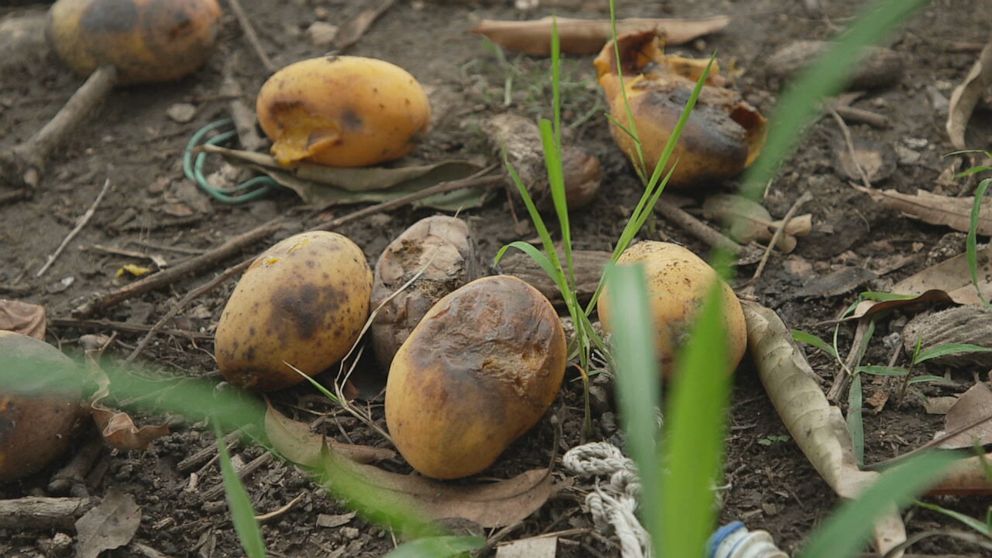
Gangs will not let farmers sell their products.
They say they will not go to the markets anymore, prisoners without a prison, held in place by a palpable fear about what happens if they leave the confines of the farm.
The dirt roads and threatening skies forced ABC News to leave shortly after the interview. Around here, it's the gangs or the rain that makes the roads impassable.
Back in town, there are those that are trying to help. The WFP has set up a small, temporary market in a relatively safe part of Gonaives, where it buys food directly from farmers.
Country Director Jean-Martin Bauer, an American whose mother is from Haiti, acknowledged it's just a drop in a gigantic bucket of need but said they have to try.
It's brave to even attempt it, given the violence WFP itself has faced here. Last year, its storehouse, a massive space filled with grains and rice, was ransacked. Hundreds of people stormed the complex, breaking through a concrete wall, completely emptying the warehouse before setting it on fire.
It remains empty to this day.
There is deep-seated resentment among many Haitians about the role international aid groups have played in the country.
Bauer understands the frustration but his commitment, he says, is to help and that requires showing up. So, he and his team keep fighting, not only to help on a day-to-day basis but to sound the alarm internationally.
More than $700 million has been requested by the U.N. to address the humanitarian crisis in Haiti. Only 23% of that appeal has been funded at the time of publication.
"Haiti is in deep trouble," said Bauer. "Haiti is not at risk of becoming a forgotten crisis. Haiti is a forgotten crisis."
Thousands have taken advantage of the Biden administration humanitarian program.
By Matt Rivers
July 31, 2023

PORT-AU-PRINCE, Haiti -- Cité Soleil is a Port-Au-Prince, Haiti, neighborhood of hundreds of thousands of people. It's one of the most desolate slums in the world and the center of a gang war between two powerful groups, G-9 and G-Pep. They're fighting for control over the area's large industrial complexes and access to one of the city's few major ports. The battle has lasted for the better part of two years.
The gang in control of this particular section of the neighborhood allowed ABC News in as long as no images were recorded passing into their territory. They did not want their enemies to learn anything about their defensive posture.
Still, lots of eyes were warily watching the ABC News convoy as it entered, joining a convoy led by the United Nations World Food Programme. The U.N. partners here with a local non-governmental organization (NGO) called Hands Together, bringing life-saving meals to the most vulnerable of populations—children.
This story is part of a series, "Haiti: The Forgotten Crisis." Please click here for more.
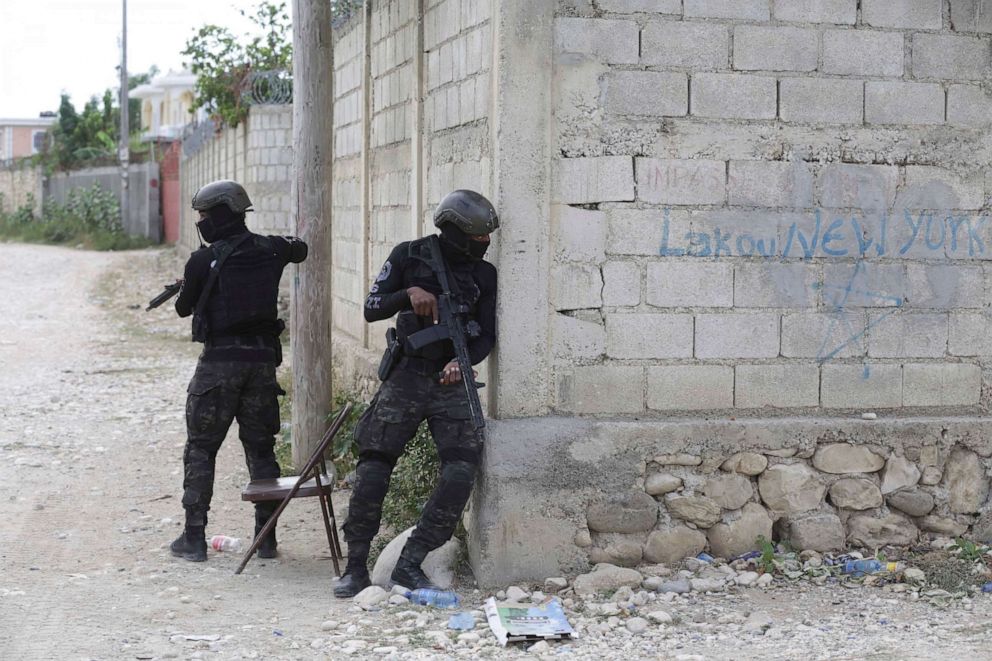
National Police patrol during an anti-gang operation in the Tabare neighborhood of Port-au-Prince, Haiti, Tuesday, July 25, 2023. (AP Photo/Odelyn Joseph)
Odelyn Joseph/AP
The school itself is a large open courtyard bordered on all sides by 12-foot-high concrete walls topped with barbed wire. A dozen or so classrooms are filled with kids separated by age, from five to 14 years old.
Evens Brelhomme works with Hands Together and grew up in Cité Soleil and says the peace inside this school is very fragile.
"There's shootouts here sometimes," he told ABC News. "Sometimes the gangs will climb the walls and use the school as a base. Sometimes the police will do the same."
Case in point: Inside one of the classrooms, a section of crumbling concrete is actually collateral damage from a recent gang skirmish.
"This is where it hit," said Brelhomme, brushing the spot where a bullet smashed into the wall, a stray let loose during a firefight a few months back while the kids were inside. "It's terrifying. Sometimes you even find bullets in the yard."
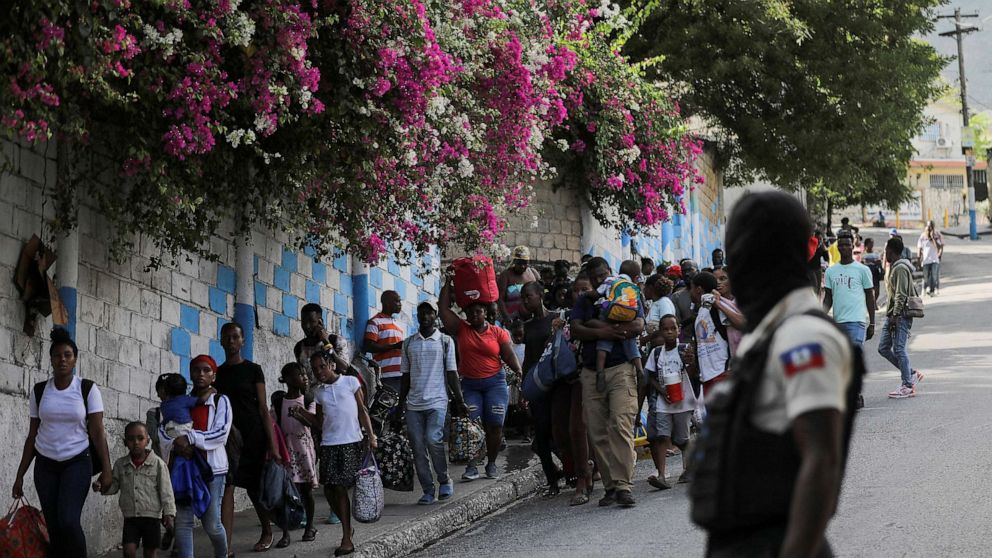
People carry their belongings while fleeing their homes and neighbourhood due to clashes between gangs, in Port-au-Prince, Haiti April 24, 2023.
ABC News spotted an unspent 9 mm round lying in the dirt minutes later. Told you, Brelhomme says.
It's about then a skinny kid in a school uniform tugs at Brelhomme's shirt. Michael Francois is a 12-year-old student, and he wants to talk.
"When I hear the shooting, I feel like I am nothing and I feel very weak. I go under my bed or try to close my ears to not hear it," he said.
ABC News received permission from his teacher and he led the way out the front gate of the school to his home right nearby. He showed ABC News the bed he hides under and introduced his mother. Shootings are just part of life, she said. But it's never been worse than this.
In the second half of 2022, the U.N. said more than 250 people were murdered in a section of Cité Soleil called Brooklyn, including 95 in just one horrific day. The U.N. also documented at least 57 gang rapes of women and girls.
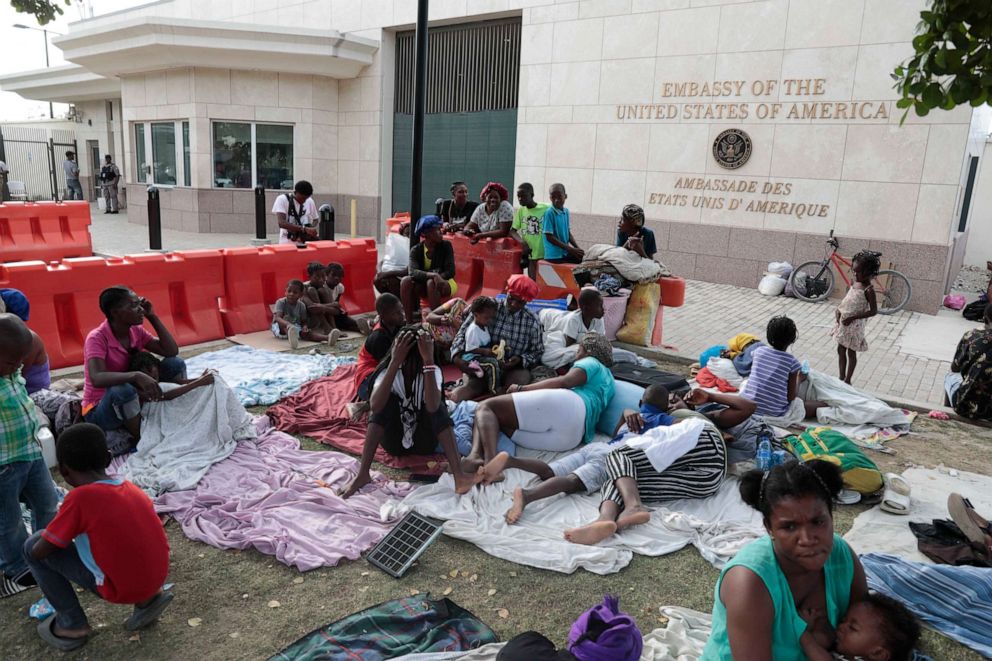
People displaced by armed gangs from their homes in the Tabare neighborhood rest outside the U.S. embassy in Port-au-Prince, Haiti, Tuesday, July 25, 2023.
Odelyn Joseph/AP
The violence gets so bad that sometimes, this entire community is cut off from the outside world.
No food or water gets in and no trash gets out. Those horrific conditions led to a cholera outbreak last year, the first such event in Haiti since 2019. Dozens were killed, according to U.N. estimates. And it was in Cité Soleil that the WFP recently recorded famine-level conditions for tens of thousands of people, the most extreme classification on its hunger scale. That's never happened in Haiti before.
"I would like the shooting to stop so people can go out freely, be at home and have normal lives," said Michael.
Haiti's chaos has driven record levels of migration, with hundreds of thousands of Haitians leaving over the past several years.
Nearly 50,000 have taken advantage of a Biden administration humanitarian parole program, according to U.S. government data, and have been granted legal entry to the U.S. Others have made the treacherous voyage from South America up through the Colombia-Panamanian jungle, eventually arriving in Texas or Arizona or California.
Still others have taken what might be the most dangerous journey of them all, setting sail through the Caribbean after taking off from an island famous in its own right.
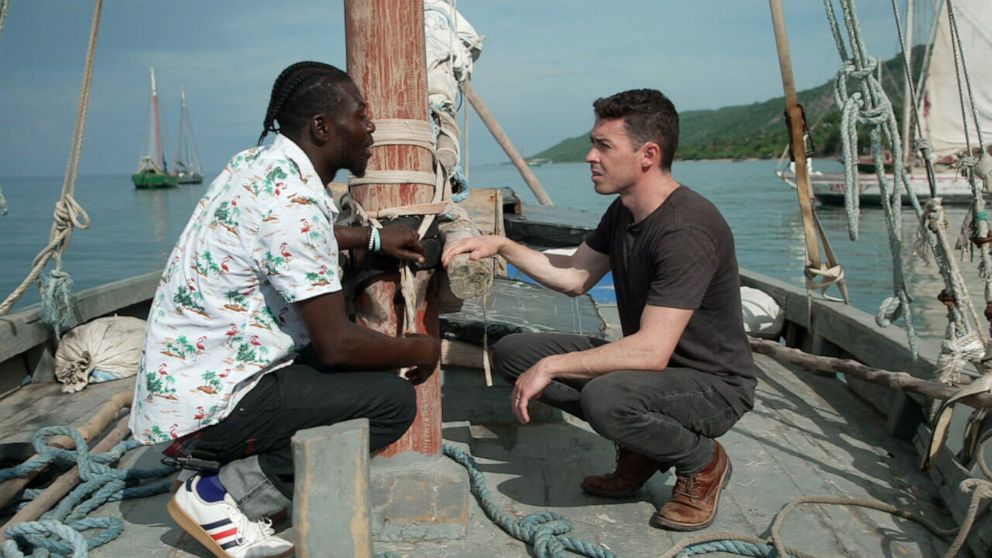
A smuggler shows Matt Rivers where they tie passengers who get scared during the dangerous voyage from Haiti to the U.S.
Matt Rivers/ABC News
Turtle Island, just off the coast of northern Haiti, has a history of smuggling and illicit activity that goes back hundreds of years. It was once a stronghold for buccaneers in the 16th and early 17th centuries.
The island has now become home to a nascent industry of human smuggling. More and more fishermen have become smugglers, using their knowledge of these waters to engage in a far more profitable endeavor.
Prices for human trafficking have skyrocketed as would-be migrants pay thousands of dollars each to book a spot on a sailboat usually headed for South Florida.
Several of these vessels are visible in a small inlet, dotted by two dozen or so boats. The bigger ones moor a few dozen meters offshore, passengers ferried to and from by a couple of teenage boys pushing row boats with long wooden poles.
At the end of a steep dirt road is a concrete hut used by many migrants over the years. This time, it was occupied by two women, Jeanette and Keisha, both in their mid-twenties, both waiting to travel to the U.S.. They asked to be identified only by their first names, nervous about any reaction from U.S. immigration authorities.
"I had no other choice than to come to Turtle Island and try to leave," said Keisha.
This was not her first choice but back home in Port-au-Prince, she was constantly scared for her life. "I could see gang soldiers in front of my home every day," she said.
Once on Turtle Island, she met Jeanette, whose story is very similar. They're both from the capital, both victims of violence and terrified of going home. It's simply not an option anymore.
"I'm going to risk it because I'm already here," said Jeanette.
Both women are mothers of young children they're choosing to leave behind for now with relatives, trying to get to the U.S. to give them better lives. It's an expensive dream.
They've both said they've paid about $3,000 for the journey, their entire savings, a staggering sum in a country where the average annual household income is less than $1,500. Jeanette and Keisha have been on the island for a few weeks now, waiting for the boat to depart.
Back in the inlet, a moored sailboat with fading gray paint and a blue stripe along the side rocks gently in the light breeze.
The captain, who says his name is Jacqueline Aristide, is aboard. He's friendly, gracious even, showing off the boat he sails back and forth to the U.S.
It takes less than 10 seconds to walk aft to stern, about 20 feet long and bare bones. About 50 people can line the top deck but the true horrors lie beneath.
The cramped hull is lined with old sugar bags, now filled with sand and rock as ballast. There's next to no air flow, no windows and it's remarkably hot.
Aristide puts as many people down below as he does up top. The business only works, he says, when he has as many people on board as possible.
It takes about five days to sail to the U.S. if all goes well. The U.S. Coast Guard has captured many such vessels in the last two years, often jammed with dozens and dozens of people.
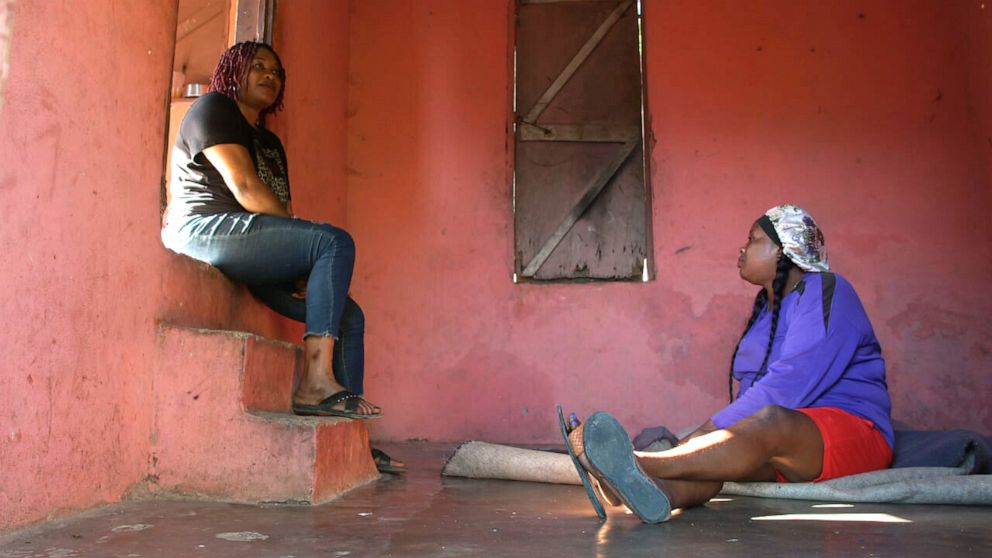
Jeanette and Keisha are stranded on Turtle Island in their bid to leave Haiti for the U.S.
Matt Rivers/ABC News
Captains, crew and passengers are usually deported back to Haiti in days.
"Sometimes I reach the coast. Sometimes the [U.S. Coast Guard] catches us. Either way we just come back here and do it again," said Aristide.
For most migrants, it's their first time on board a boat for a long stretch.
Aristide crouches down next to the mast and picks up a weathered rope. This is what they use, he said, when people break down – when the heat and the ocean and the vast emptiness of it all gets to be too much.
"We lay them down and we tie them to the mast with this rope. Then we pour water over their head to calm them and ask them how they're feeling," he said. Absent such extreme measures, he said, they could be a threat to others on board.
"In all my years, no one has died on board," he said.
It's impossible to know how many have died taking this journey on this boat or the many others operating in these waters.
"Yes, I am afraid," said Jeanette. "There are people who travel in the boats and lose their lives. Sharks eat them. For some of them, it's the heat that kills them."
Aristide will only sail when he has a full boat and the numbers have slowed a bit as of late. More people have been trying to go the legal way, taking advantage of that Biden administration humanitarian parole program.
But everyone here expects the lull to be temporary. The numbers will pick back up again because Haiti's problems are myriad and their solutions are elusive.
The only guarantee is that more people will do whatever it takes to try and flee.
"I don't want to give up," said Jeanette. "I'm staying strong because it's my dream to go. I need to go."
-ABC News' Etant Dupain, Brandon Baur and Aicha El Hammar Castano contributed to this report.
No comments:
Post a Comment